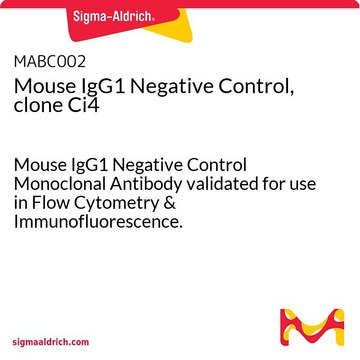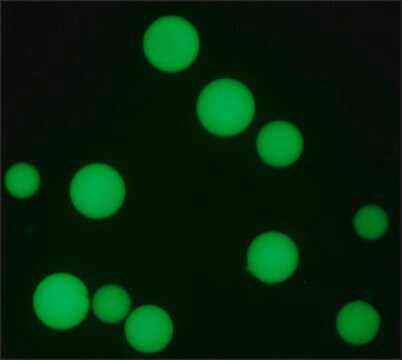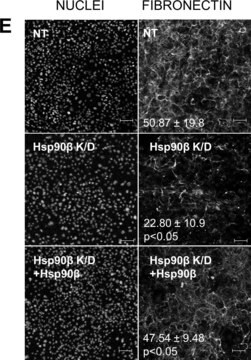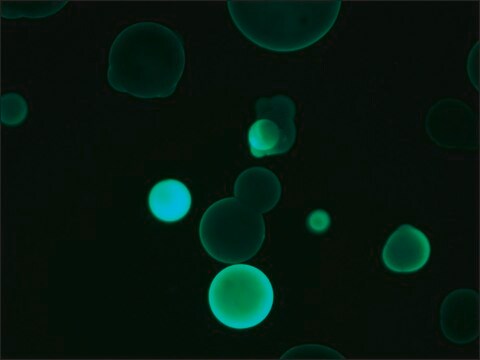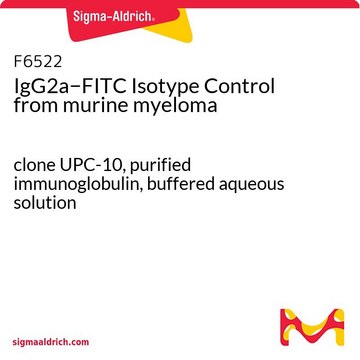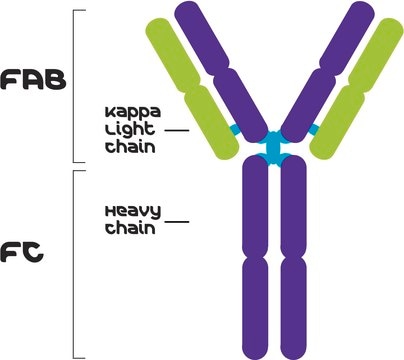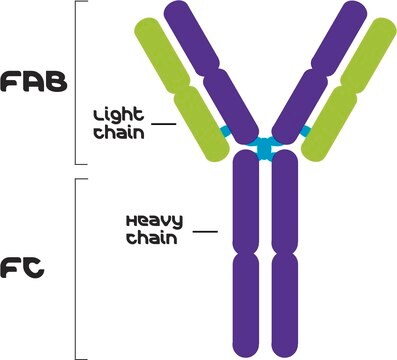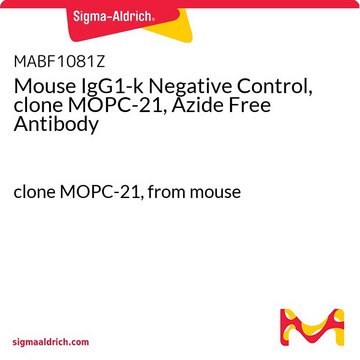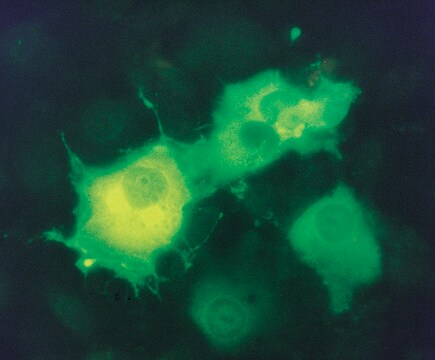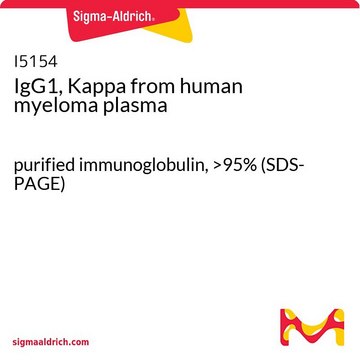F6397
IgG1−FITC Isotype Control from murine myeloma
clone MOPC 21, purified immunoglobulin, buffered aqueous solution
Synonim(y):
IgG1 Isotype Control from murine myeloma
Zaloguj sięWyświetlanie cen organizacyjnych i kontraktowych
About This Item
Kod UNSPSC:
12352203
NACRES:
NA.46
Polecane produkty
pochodzenie biologiczne
mouse
białko sprzężone
FITC conjugate
forma przeciwciała
purified immunoglobulin
klon
MOPC 21, monoclonal
Formularz
buffered aqueous solution
warunki przechowywania
protect from light
metody
flow cytometry: suitable
Warunki transportu
wet ice
temp. przechowywania
2-8°C
docelowa modyfikacja potranslacyjna
unmodified
Szukasz podobnych produktów? Odwiedź Przewodnik dotyczący porównywania produktów
Opis ogólny
Immunoglobulina G (IgG) należy do rodziny immunoglobulin i jest powszechnie wyrażanym przeciwciałem surowicy. Immunoglobulina ma dwa łańcuchy ciężkie i dwa łańcuchy lekkie połączone wiązaniem dwusiarczkowym. Pomaga głównie w obronie immunologicznej. Jest to glikoproteina. IgG jest główną klasą immunoglobulin. Mysz składa się z pięciu klas immunoglobulin - IgM, IgG, IgA, IgD i IgE. Mysie IgG jest dalej podzielone na pięć klas - IgG1, IgG2a, IgG2b i IgG3.
Zastosowanie
Kontrola izotypu IgG1-FITC ze szpiczaka mysiego została użyta jako kontrola negatywna w FACS populacji ludzkich komórek erytroidalnych, które wykazują ekspresję CD17.
Kontrola izotypu IgG1?FITC ze szpiczaka mysiego została użyta w cytometrii przepływowej i jako negatywna kontrola barwienia.
Działania biochem./fizjol.
Immunoglobulina G (IgG) odgrywa główną rolę w reakcjach nadwrażliwości typu II i typu III. IgG jest również zaangażowana w opsonizację, wiązanie dopełniacza i cytotoksyczność komórkową zależną od przeciwciał.
Podtyp przeciwciał IgG jest najobficiej występującą immunoglobuliną układu odpornościowego. Jest on wydzielany przez komórki B i znajduje się we krwi oraz płynach pozakomórkowych, zapewniając ochronę przed infekcjami wywołanymi przez bakterie, grzyby i wirusy. Matczyne IgG są przekazywane płodowi przez łożysko, co ma kluczowe znaczenie dla obrony immunologicznej noworodka przed infekcjami.
Postać fizyczna
Solution in 0.01 M phosphate buffered saline, pH 7.4, containing 1% bovine serum albumin and 15 mM sodium azide.
Uwaga dotycząca przygotowania
Prepared by conjugation to fluorescein isothiocyanate isomer I (FITC). This green dye is efficiently excited at 495 nm and emits at 525 nm.
Oświadczenie o zrzeczeniu się odpowiedzialności
O ile nie określono inaczej w naszym katalogu lub innej dokumentacji firmy dołączonej do produktu(-ów), nasze produkty są przeznaczone wyłącznie do użytku badawczego i nie mogą być wykorzystywane do żadnych innych celów, w tym między innymi do nieautoryzowanych zastosowań komercyjnych, zastosowań diagnostycznych in vitro, zastosowań terapeutycznych ex vivo lub in vivo lub jakiegokolwiek rodzaju konsumpcji lub zastosowania u ludzi lub zwierząt.
Ta strona może zawierać tekst przetłumaczony maszynowo.
Kod klasy składowania
10 - Combustible liquids
Klasa zagrożenia wodnego (WGK)
nwg
Temperatura zapłonu (°F)
Not applicable
Temperatura zapłonu (°C)
Not applicable
Środki ochrony indywidualnej
Eyeshields, Gloves, multi-purpose combination respirator cartridge (US)
Wybierz jedną z najnowszych wersji:
Masz już ten produkt?
Dokumenty związane z niedawno zakupionymi produktami zostały zamieszczone w Bibliotece dokumentów.
Klienci oglądali również te produkty
Loss of Fas (CD95/APO-1) regulatory function is an important step in early MALT-type lymphoma development
Seeberger H, et al.
Laboratory Investigation; a Journal of Technical Methods and Pathology, 81(7), 977-977 (2001)
Murat O Arcasoy et al.
British journal of haematology, 130(1), 121-129 (2005-06-29)
The regeneration of circulating red blood cells in response to anaemia associated with blood loss or haemolysis involves an increased rate of erythropoiesis and expansion of proerythroblasts, the bone marrow precursor cells that terminally differentiate into mature erythrocytes. This study
The Laboratory Rat (1998)
The Immunoglobulins: Structure and Function (1998)
Molecular Genetics of Immunoglobulin, 17 (1987)
Nasz zespół naukowców ma doświadczenie we wszystkich obszarach badań, w tym w naukach przyrodniczych, materiałoznawstwie, syntezie chemicznej, chromatografii, analityce i wielu innych dziedzinach.
Skontaktuj się z zespołem ds. pomocy technicznej
